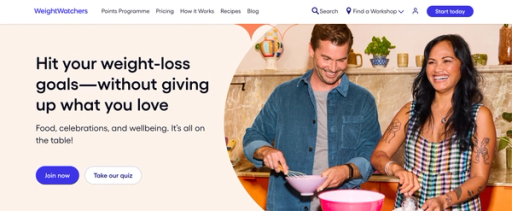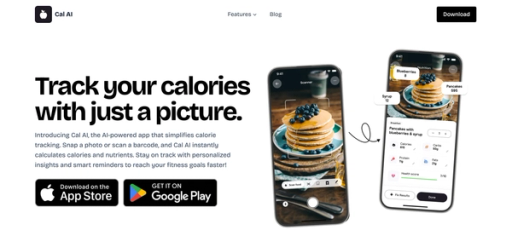
Countless people struggle with weight loss. You may start strong, but life gets in the way, and staying motivated and on track becomes hard. Thankfully, apps like Weight Watchers can help you get started on your weight loss journey and stay focused and motivated over time. In this article, we'll explore the benefits of using an app like Weight Watchers and help you find a suitable alternative that fits seamlessly into your lifestyle.
Cal AI’s calorie tracker is one of the best apps to track macros and is a valuable tool to help you achieve your weight loss goals. Not only does it make tracking progress easy, but it also provides personalized insights that help you stay motivated on your journey.

WW, previously (and still more commonly) known as Weight Watchers, is a points system weight loss program that calculates your personal nutrition needs based on your height, weight, age, and activity level. Your assigned daily points are designed to track what you eat.
Every food has a point value; members are instructed to use the allotted points daily without going over or under. WW prides itself in being a wellness brand, but at its core, it's still a diet with the goal of weight loss. In a world where the dieting market is endless and healthy is the new skinny, one of the world's most popular diets had to do something to reimagine itself.
In 2018 Weight Watchers went through a rebranding initiative with a new slogan, "Wellness that Works." While the point system remains, the Weight Watchers system is now marketed as a personalized weight loss (and wellness) program. Gone are the days of weekly weigh-ins and group meetings; instead, log your food digitally and find support virtually through the WW app.
Another big change is that some significant high-cost point foods like beans, avocado, and potato (which are energy-dense) are now zero. While this sounds like a win, it can confuse someone trying to limit their calorie intake.
On the other hand, the points system is restrictive and can lead to binging or saving up points to overeat later in the day. This is probably why Weight Watchers changed its system to allow "ZeroPoint" foods, though it's unclear whether this is better or worse for the program.
Weight Watchers (WW) has several advantages. For one, its program is backed by research. A 2021 study published in Obesity found that participants who followed WW lost an average of 15.2 pounds over 6 months, while those in a control group who received no dietary guidance lost an average of 1.5 pounds.
Another appeal of WW is that it's flexible and allows for personal preferences. You can eat whatever you want on the program. If you want pizza, you can have it. If you want chocolate cake, you can have a slice. The key is moderation and staying within your personalized points target.
Many dieters enjoy the community support offered through WW. You can attend in-person meetings or connect with members online through the program's app and website.
Weight Watchers does have some downsides that may prompt users to consider alternatives. For one, the program can be costly. When you sign up for WW, the first thing you'll do is choose the duration of the program and cost per duration (6 months, 3 months, or 1 month).
From there, you'll select add-ons like one-on-one coaching or instructor-led workouts, all of which come at an additional fee. Be sure to consider how much you'll pay each month for the duration of the program before deciding if it fits within your budget. Pay upfront for several months or lock in a promotion to make it slightly more affordable.
You can also check with your insurance provider; many insurance companies will offer discounts or reimburse you for participating in Weight Watchers. If you're still unsure, a 2019 study analyzed the cost for a group of women to lose 5% of their body weight using Weight Watchers, which came in at a total of $1,610.
While this sounds like a lot, this amount was still far less than the other weight loss programs studied. Curves Complete costs $8,613 to achieve the same goals over two years. This brings the price to around $67 per month.
Many people find counting points and tracking their nutrition annoying. It can also become stressful trying to stay within your daily points budget. Not to mention, for some people, focusing so intensely on what they're eating throughout the day can lead to an unhealthy relationship with food and create disordered eating behaviors, quite the opposite of what is necessary for sustained and healthy weight loss.
You'll need to weigh in once weekly at an in-person meeting or virtually to track your progress. For some people, this can create unnecessary stress surrounding the number on the scale, while others may feel uncomfortable being weighed in front of others. If you have a bad day based on your weight on the scale, weighing yourself often is probably not a wise habit to form.
On the other hand, some people find weekly weigh-ins helpful and encouraging in monitoring their progress and keeping them accountable and on the right track.
For some, unlimited access to zero-point foods may be too challenging at this stage in their weight-loss journey. If you think you'll be overeating zero-point foods or saving up PersonalPoints for less nutritious foods later in the day, finding a more structured weight loss plan may suit you better.
Avid dieters can vouch for the stress of counting points and following a program. If your diet program interrupts your social life or takes over your thoughts, it's becoming unhealthy for you. Many of the components of Weight Watchers can contribute to unhealthy dieting, including:

Cal AI transforms calorie tracking with cutting-edge AI technology. Just snap a photo of your meal, and we'll do the rest.
Our app combines your phone's depth sensor with advanced AI models to:
With 90% accuracy on visible foods and multiple tracking options like:
We've made nutrition tracking effortless. Whether you're scanning a full meal or a quick snack, Cal AI
Our AI learns from your feedback to improve accuracy. It includes personalized insights and smart reminders to keep you on track. Cal AI makes achieving your fitness goals simpler than ever.
Track your calories with your camera using Cal AI's calorie tracker today!
Noom’s got a different vibe. The app focuses on changing your mindset and pairs tech with psychology to tackle weight loss. Noom is smart. It asks questions, learns about you, and then crafts a plan about more than calories—it’s about habits.
What we like about it:
Its psychological approach is a game-changer. It’s not just an app; it’s like a pocket-sized psychologist helping you understand the ‘why’ behind your eating habits.
MyFitnessPal is the old-school homie in the digital nutrition and exercise space. It’s like that massive library of foods where you can log what you eat and track workouts so nothing slips past you.
What we like about it:
The size of its food database is unreal. You can find nearly any food, so tracking your food is a breeze.
Lose It! is your straightforward calorie counting partner with this ‘snap it and track it’ feature. You snap a pic of your grub, which logs calories for you. It’s simple, effective, and keeps your weight loss goals front and center.
What we like about it:
That “Snap It” feature is slick—snap your meal, and Lose It! keeps you aligned with your calorie budget.
MyPlate by Livestrong ditches the food pyramid and uses a user-friendly plate method to track your nutrition intake. It’s a visual and intuitive guide to balanced eating.
What we like about it:
The plate method makes visualizing your daily diet simple; no more second-guessing if you’re doing it right.
Looking for a sous chef for meal planning? PlateJoy is it! It offers personalized meal plans and shopping lists customized to fit your taste and nutritional needs. It even considers your schedule, so you can cook when you want.
What we like about it:
Personalization is key here; meals are crafted just for you, matching your diet and busy lifestyle.
It’s not just a band on your wrist; FitBit’s app turns those steps and heartbeats into a complete fitness picture. It’s about more than steps—sleep, nutrition, and activity wrapped into a streamlined interface.
What we like about it:
Sleep tracking is a standout; it’s fascinating to see how it links with fitness goals.
Fooducate is the secret weapon in making informed food choices. It cuts through the marketing noise and grades your food, empowering you to pick items that nourish your body.
What we like about it:
The grading system is a hit; no need to decode labels when Fooducate spells out what’s good and what’s not.
Micros, macros, and everything in between, Cron-o-meter gets precise with your nutri stats. Tailoring your diet to the nitty-gritty it’s for those who love details and want control over every nutrient.
What we like about it:
It’s about precision; every bit of your diet is accounted for, so you’re left guessing nada.
FatSecret feels like a confidante on your weight-loss journey, keeping things simple with its calorie tracking and bolstering your efforts through community forums and professional advice.
What we like about it:
The community angle is strong; it’s like having a weight loss support group in your pocket.
Healthi, previously iTrackBites, rocks a point system that brings flexibility in tracking what you eat: different plans to manage your weight without being overtaken by the calorie counting craze.
What we like about it:
Flexibility shines. Tracking food through points allows for less stress and more manageable lifestyle shifts.
My Diet Coach offers a suite of motivational tools—from entertaining reminders to challenge you to diet diaries for mindfulness about eating.
What we like about it:
Motivation is key; those little nudges and alarms keep your goals within arm’s reach.
RiseUp + Recover stands as an ally for those managing eating disorders. Meal logging, coping skill support—a compassionate digital recovery space.
What we like about it:
It’s an app with heart; the focused support on eating disorders is pivotal for many seeking recovery.
More than trackers, Spark People offers comprehensive health with fitness videos, nutrition guidance, and a welcoming community. It’s an all-in-one platform that’s geared toward igniting your health journey.
What we like about it:
That all-encompassing approach it’s a one-stop-shop, feeding your appetite for fitness and well-being.
Lifesum is another unique food tracking app because it focuses on individualized meal plans with its premium version. You must pay a small fee to access these plans, as their free version only allows for basic calorie tracking. They offer various eating plans, including popular diets like:
You can take a simple test to determine which plan would be best for you, but you can switch to any plan you want anytime. This provides more direction than just focusing on calories and points; plans even include the following:
Another low-cost app to use instead of Weight Watchers is the Ultimate Food Value Diary. You can use this app as a one-stop shop for tracking your food and exercise, an online database for eating out, and weight and measurement tracking.
The list is endless, so here is how you can use it. One of the bonuses with this app is the Extra Boost ™ option. This helps you determine the optimum calories you should eat daily to lose weight.
The Simple app takes a very simple approach to intermittent fasting by providing timers until your next fasting period and an artificial intelligence “coach” that rates your meals based on nutritional value. All you have to do is snap a picture of your plate, and the AI assistant will rate your meal from 1 to 4 based on things like protein and fat content.
It’s important to note the AI coach is the only accountability buddy on the app. There’s no human coaching or community element, which might be a deal-breaker for some people. The app uses neutral language when discussing food, meaning it doesn’t label any meals as “bad” or “good” like other apps.
The app is free to download and use for most features, though Pro subscribers can get more personalized plans.
Many weight loss apps focus on food intake and counting calories more than fitness tracking. But Apple Health is more about physical activity and other lifestyle factors, like sleep and cycle tracking.
It tracks active exercise and calories burned, but it also considers other aspects of your overall activity level, like time spent standing, walking speed, walking steadiness, walking heart rate, and flights of stairs climbed. It monitors other health metrics, too, including:
One thing you don’t get with Apple Health is food-calorie tracking. You can monitor your weight and other related body composition metrics, like body fat percentage and body mass index (BMI), but it won’t spit out recommended daily calories to help you hit your weight loss goals.
If you’re following a keto diet, you’ll need a weight loss app that can accurately track carbohydrates and, ideally, net carbohydrates. While many apps have this functionality, it’s often a premium feature. Carb Manager still tracks calories, but it puts carbs at the forefront, and there are more than 5,000 low-carb recipes in the free version of the database.
While carbohydrates are the primary consideration with the keto diet, Carb Manager can also track water intake, intermittent fasting times, and workouts. If you upgrade to the premium version, you can also see your micronutrient intake.

Assessing the ease of use of an app like Weight Watchers is crucial before considering its features. If the app isn’t user-friendly, you won’t stick it long enough to reap the potential benefits. This could be compared to a new gym with lots of shiny equipment, but the layout is so confusing you can’t find your way around.
You could lose interest before you ever learn how to use any tools to help you reach your goals. Weight loss apps are meant to make your life easier. If a weight loss app isn’t user-friendly or too frustrating to use, you won’t stick with it—bottom line.
Most weight loss apps have basic features, like food, physical activity, and water intake tracking, but there are many beneficial components beyond that. For example, access to coaching and/or a community will help with accountability and social support.
Informational resources and cognitive-behavioral exercises can help with mindset and background knowledge, especially for beginners. There isn’t a “must-have” list of features for everyone; you just have to figure out what’s essential or most helpful to you and ensure your chosen app has it.
There are two things to consider here. First, is it available on the operating system I use (iOS or Android)? Second, will it accurately sync with my preferred activity tracker, like an Apple Watch, Fitbit, or Whoop?
If I only want to use the app on my phone or iPad and don’t care if I have to enter workout information manually, this is less of a concern. But if I want seamless tracking, I’ll want to ensure the app I choose is compatible with all my devices.
Many free weight loss apps are out there, but many aren’t fully functional without a paid subscription. When choosing a weight loss app, consider the all-in price. It might be free to download, but the free version isn't useful if I can’t access the most important features without paying. In this case, I consider the price of the premium version and decide if it’s within my budget.
Cal AI transforms calorie tracking with cutting-edge AI technology. Just snap a photo of your meal and we'll do the rest. Our app combines your phone's depth sensor with advanced AI models to analyze food volume, identify ingredients, and instantly calculate calories, protein, carbs, and fat content.
With 90% accuracy on visible foods and multiple tracking options like barcode scanning, food label recognition, and manual description for complex items like smoothies, we've made nutrition tracking effortless. Gone are the days of tedious manual logging calorie tracking apps.
Whether you're scanning a full meal or a quick snack, Cal AI gives you accurate nutritional information in under 15 seconds. Plus, our AI learns from your feedback, continuously improving its accuracy. Stay on track with personalized insights and smart reminders. Cal AI makes achieving your fitness goals simpler than ever.
Track your calories with your camera with Cal AI's AI calorie tracker today.